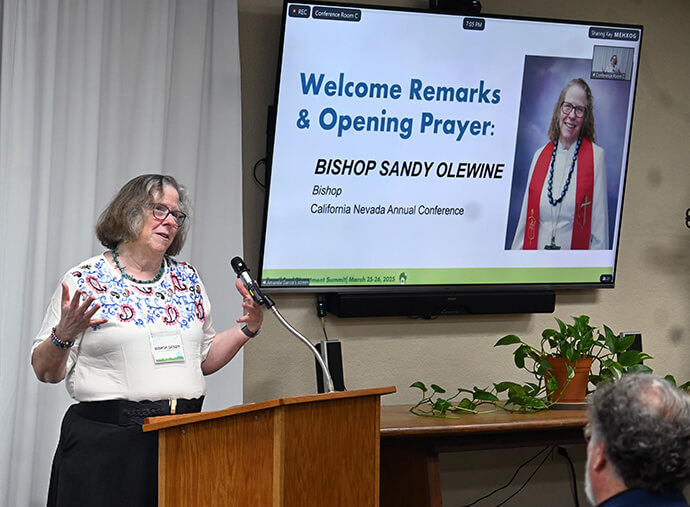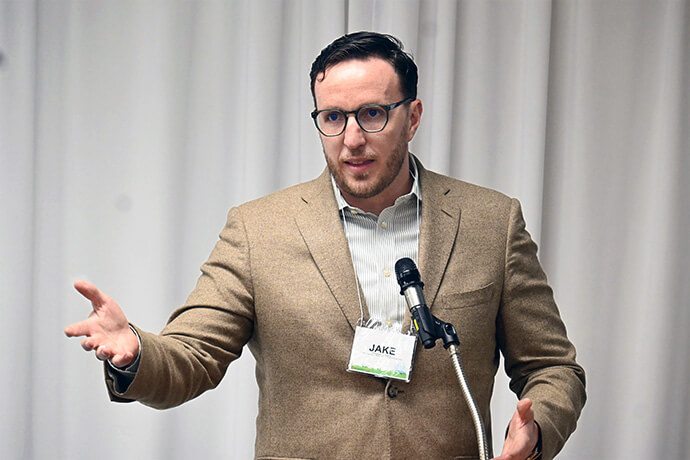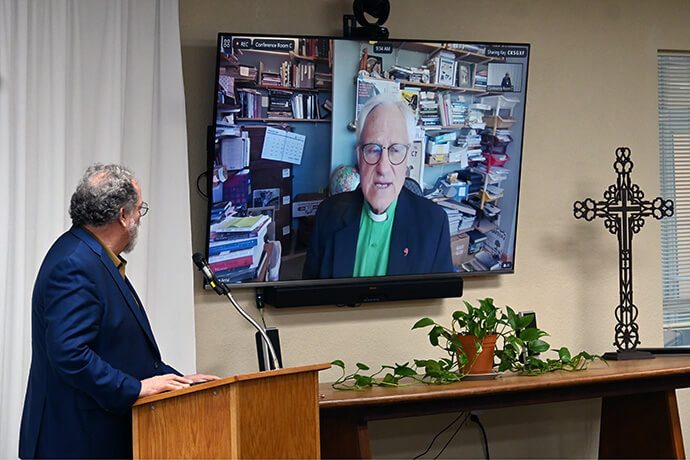Key points:
- Representatives from the California-Nevada Conference’s financial agencies are recommending halting investments in fossil fuel because of the environmental harm they cause.
- A resolution has been proposed that will be presented at the June 27-30 California-Nevada Annual Conference for approval.
- Divesting interests in fossil fuel need not be a financial sacrifice, United Methodist leaders said.
- The denomination’s pension and benefits agency has set up the Social Values Choice Equity Fund to serve those uncomfortable with fossil-fuel investments.
Dire warnings were leavened by occasional and much-welcomed reassurance at a United Methodist summit, where California-Nevada Conference members reached an agreement to divest from fossil-fuel related investments.
“The hour is late and the bridegroom is indeed coming,” said the Rev. Richenda Fairhurst of Fossil Free UMC, a grassroots caucus. “We don’t have many years left to do this work, and it has to get done.”
A few weeks after the summit, representatives of the conference’s financial agencies finalized a statement of intent to be taken up June 27-30 at the California-Nevada Annual Conference to divest from fossil fuel investments in a to-be-determined time frame. The United Methodist Church’s New York and Pacific Northwest conferences passed divestment resolutions some years ago.
“We agree that fossil fuels continue to drive climate change and that their production and usage harms the planet, especially poor and minority communities and countries,” the California-Nevada statement reads in part. “For these reasons, swiftly moving toward renewable forms of energy and away from fossil fuels is a crucial issue.”
The good news is that lessening fossil-fuel investments has not been a drag on the retirement savings of people in the denomination, said Jake Barnett, managing director of sustainable investment strategies for Wespath Benefits and Investments. The denomination’s pension and benefits agency has set up the Social Values Choice Equity Fund to serve those uncomfortable with fossil-fuel investments. It produces competitive returns, he said.
“This is not designed to be a sacrificial financial option,” Barnett said. “It’s designed to perform in alignment with the market.”

Bishop Sandra Olewine of the California-Nevada Conference echoed Barnett during an interview at the summit.
“You don’t have to feel like you’re making a financially bad decision,” Olewine said. “You can actually make this change to fossil fuel-free investing and still provide a very good return, and in some cases a better return.”
Olewine spoke at the California-Nevada Summit on Fossil Fuel Divestment, held March 25-26 at the California-Nevada Conference Center. The event, which was stipulated at the last annual conference meeting, was hosted by the Cal-Nevada Conference Council on Finance and Administration and chaired by the Rev. Burke Owens.
The discussion by about 25 people at the summit was alternately hopeful about getting something done and fearful that it may be too late.
“If the world is going to remain inhabitable beyond the next 50 years, the fossil fuel industry will have to leave at least $1.4 trillion worth of oil, coal and gas in the ground over the next three decades,” said Jim Antal, the special adviser on climate justice for the United Church of Christ. He appeared at the summit remotely as a guest adviser.
“Individuals who become CEOs of oil companies tend not to be the sort of people who will abandon $1.4 trillion without, let us say, a struggle,” he said.
According to the United Nations, climate change can impact health, ability to grow food, housing and more.
“Conditions like sea-level rise and saltwater intrusion have advanced to the point where whole communities have had to relocate and protracted droughts are putting people at risk of famine,” says the U.N. website. “The number of people displaced by weather-related events is expected to rise.”

At last year’s General Conference, Fossil Free UMC and allies sought to amend Paragraph 717 of the Book of Discipline, which deals with Sustainable and Socially Responsible Investments. The policy lists alcohol, tobacco, gambling, pornography, weapons production and for-profit prisons as off-limits for United Methodist entities’ investments. To those investment screens, Fossil Free UMC wanted to add fossil fuel companies, but that effort did not succeed.
Wespath serves 100,000 retired and active clergy and other church staff, and more than 150 United Methodist-related institutional investors. The agency has sustainability initiatives but has opposed divestment of fossil fuel company stocks. It argues that it can better influence such companies’ conduct by “staying at the table” with them.
Subscribe to our
e-newsletter
Wespath maintains that position for most of its investment funds, with the Social Values Choice Equity Fund being the exception, Barnett said.
“Recognizing that sometimes between Wespath and folks that have been pushing for divestment, there has been an acrimonious relationship, I’m hoping to find that there is extensive common ground about care for creation, about respect for human rights, about pushing these issues forward,” Barnett said.
The Social Values Choice Equity Fund, actually a series of funds, was created at Wespath in 2017 and expanded in 2024. The social values funds do not invest in companies that derive a significant amount of revenue from involvement in the fossil-fuels industry and other sources that include gambling, alcoholic beverages, tobacco products, pornography, weapons or for-profit prison companies. The exclusions also include the countries Israel, Turkey and Morocco, which were named in a resolution at General Conference last year for concerns about military occupation.
The fund managers “lean in to those companies where we might see better leadership on environmental, social and governance issues,” Barnett added.
Changing one’s outlook to one of abundance instead of scarcity would help when talking about climate change, said William Morris, an organizer with GreenFaith and chair of Young Evangelicals for Climate Action. He was the keynote speaker at the summit.
“I always go back to those words in Scripture for all creation to flourish — not just survive, not just to scrape by, but to flourish,” he said. “It means that there is abundance in the world and not scarcity.”
Young people are ahead of older Americans when it comes to awareness and willingness to fight climate change, he said.
“For the majority of young people, the debate on climate is not a debate,” Morris said. “They know what’s happening. They know we need to act, and so when they bring that to their church and they don’t get the same urgency, there is grief.”

Climate change, like many issues, affects the less wealthy first.
“Some argue that because fossil fuels built our modern Western economies, fossil fuel is therefore essential to developing the Third World and ending poverty,” Antal said. “This could not be further from the truth. The United Nations intergovernmental panel on climate change has been at pains to point out that people who are socially, economically, culturally, politically, institutionally or otherwise marginalized are especially vulnerable to climate change.”
It is possible to rapidly transition to renewable clean energy, Antal said.
“We now have all the technology we need to make that transition,” he added. “All we lack is the will.”
The argument for staying invested in fossil-fuel corporations so they can be reformed from the inside is flawed, Antal said.
“Shareholder activism can work when a company has a flaw in their business plan that violates moral norms and needs to be corrected,” Antal said. “But shareholder activism cannot succeed when the flaw is the business plan.
“Their business as usual will kill their children.”
Patterson is a UM News reporter in Nashville, Tennessee. Contact him at 615-742-5470 or newsdesk@umnews.org. To read more United Methodist news, subscribe to the UM News Digest.



